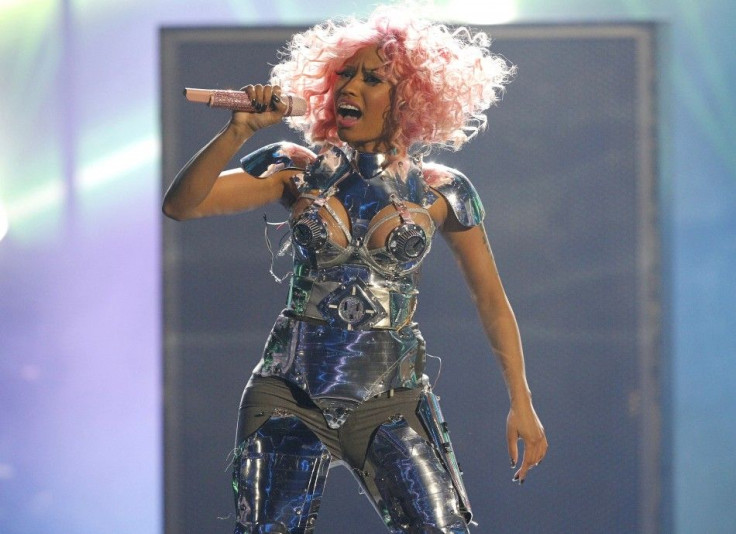Sexism Reloaded: Female MCs Still Lacking Respect
Opinion

In Congress, you'd think only men were selling women down the river, but women like Olympia Snowe, the U.S. senator from Maine, continue to embarrass and misrepresent their own gender. There is no difference in the rap game, where both men and women stand in the way of women becoming more popular.
June 3 was the night of radio station Hot 97's SummerJam, its yearly music megashow. Set to headline was Nicki Minaj, and those rumored to perform onstage with the reigning queen of rap included Nas, Lauryn Hill, and several other members from her record label crew, Young Money Cash Money. But a dark cloud was brewing over what was supposed to be the MCs return to her home area (Minaj is from New York City) after touring in Europe for the past few months.
Hot 97 DJ Pete Rosenberg dissed Minaj, saying, I know there's some chicks here waiting to sing 'Starships' later, I'm not talking to y'all right now. F--- that bullsh--. I'm here to talk about real hip-hop sh--. Minaj's mentor and label head Lil' Wayne pulled her, as well as all Young Money performers, from the playbill. Where Minaj stepped out, Nas and Lauryn Hill stepped in, but many fans and staff at Hot 97 were mad that Minaj had disappointed those who had paid to see her -- she was the headliner, after all.
Rosenberg's comments toward Minaj and her female fans were clearly sexist. Many claim that Rosenberg was not being sexist because he didn't call out Minaj as a woman; still, it is important to realize that it is because she is a woman that Rosenberg thought it OK to call her out. He also thought it OK to call out only Minaj's female fans.
DJ Rosenberg's comment about Minaj smacks of unadulterated sexism. What's interesting to me is that Rosenberg not only disrespected Minaj, but his comment also disparaged her female fans. If we look at what Rosenberg said, [his] comment belittles Minaj and her female fans who he imagines were waiting to sing along with her pop cross-over song Starships, said Oneka LaBennett, a professor of Women's Studies at Fordham University and author of She's Mad Real: Popular Culture and West Indian Girls in Brooklyn and author of a Ms. Magazine article about Nicki Minaj's impact on the self-esteem of young black women.
Most interesting is MInaj's need to prove herself continually, rather than being accepted as the current highest-selling act in hip-hop. Considering the plethora of hip-hop industry sexism she's dealt with, Minaj's meteoric rise to the top is even more amazing.
When you're a girl, you have to be like everything. You have to be dope at what you do, but you have to be super sweet, and you have to be sexy, and you have to be this, and you have to be that, and you have to be nice. It's like, I can't be all those things at once. I'm a human being, Minaj said in her MTV documentary My Time Now.
In taking offense to this comment, Minaj is holding up one of the basic tenets of hip hop: respect. And as a female MC, issues of respect are especially precarious, LaBennett said. The fact that Lil' Wayne' made the decision to pull Minaj from Summer Jam further underscores the ways in which hip hop is a male-dominated industry in which men still tend to call the shots.
Many have criticized Minaj for having an over-inflated ego, but they're actually mistaking her respect for ego. There should be no confusion here: It will always be controversial for women to stand up for themselves as opposed to men. Women, especially in hip-hop, are often considered passive, docile sex objects. Minaj wasn't being controversial, but demanding to be seen as a peer, an artist, not as a woman.
While Minaj is demanding respect for herself, she simultaneously demands respect for all female MCs. Minaj's fame and ability to make money have ushered in a new era for female rappers. The budding list includes Baltimore-based Rye Rye, Harlem speed-rapper Azealia Banks, and Australian firecracker Iggy Azalea. Already, Iggy Azalea and Azealia Banks have been documented throwing shade (disrespect) at each other, starting a war before either of them has dropped their first full album.
Each of these female rappers does owe Minaj a debt of gratitude. Minaj made female rap popular to the masses and marketable for the record companies. Why, then, do they choose to turn on each other, rather than support each other? Because men rule the rap game and men make the rules and limitations-let's call these statutes patriarchy-the most effective way to keep men on top of the rap game and to stop women from gaining popularity is to divide and conquer.
As this new crop of female rappers emerges, each should continue to embody the path that Minaj has chosen. While some may disagree with her recent foray into pop music, Minaj will not be the docile woman that many expect her to be. She will demand equal respect from the industry that any male rapper can expect. Minaj's incident should remind all, including female rappers, that it is important to demand equal respect and to practice equal respect with their peers, regardless of gender or musical taste.
Mathew Rodriguez is a graduate of Fordham University, where he majored in English and Comparative Literature, and minored in Women's Studies and Creative Writing. Mathew is a published essayist, new media journalist, and academic. He plans to pursue a PhD in English with a concentration in gender studies. Mathew is also a social activist who embraces the tenets of feminism and works for LGBT rights. When not writing, he currently works for the LGBT health/ medical services nonprofit APICHA Community Health Center as their Program Assistant.
© Copyright IBTimes 2025. All rights reserved.





















